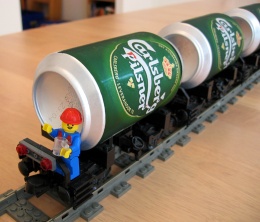The Hark Express
| The Hark Express | |
|---|---|
| Participants | Eis-T |
| Skills | Public Transportation |
| Status | Operational |
| Niche | Infra |
| Purpose | Infra |
| Tool | No |
| Location | Ideally, everywhere |
| Cost | none? |
| Tool category | |
HarkExpress_TheDream.jpg {{#if:No | [[Tool Owner::{{{ProjectParticipants}}} | }} {{#if:No | [[Tool Cost::none? | }}
The discovery of a substantial set of LEGO rails changed everything. People started dreaming about how an intricate train system could be applied at NURDspace. Can we transport frikandellen, coffee and beer from one side of the space to the other side? Can we have semi-autonomous vehicles navigating a 2D space? What will happen if we connect it to IRC and configure a !train command? Let’s find out together how we can best utilize the LEGO train system at the space!
The plan
Step 1: start somewhere.
The best thing about LEGO is the modularity of it all. So instead of starting with a masterplan we will start with a piece of rails somewhere, and we can expand the rail network from there to other parts of the space. We must remember that the Dutch rail network wasn’t built in a day either.
Step 2: Rolling stock
How good is a set of rails if we have no vehicles that use the network? These are the ideas for the engines and wagons of the Hark Express:
- A train that can be controlled from IRC. When you enter !train it moves from one station to another. Ideally it plays “authentic” trainsounds or the Tomas the Steam Engine intro song and has blinking lights while going from A to B.
- A cargo train that can hold various freshly baked Frikandellen + a “sauswagon”
- A sensor wagon with a (rotatable) camera, QR scanner and speed meter
- A party wagon with lego figures of every space member.
Inventory:
- Approx 3m of straight rails.
- 2 whole circles of round pieces
- 2 transformators to control the speed of the train
- … train switches (wissels) of which .. are electrified
- Various electric switches for manual control of switches, lights, etch
- Lego lights, both modular
- Rolling stock: one train engine with a receptor, one without.
Next steps
- Really inventorise what we have
- Attach the “first long stretch” to the wall.
- Reconsider if the rail network should go into the kitchen.



